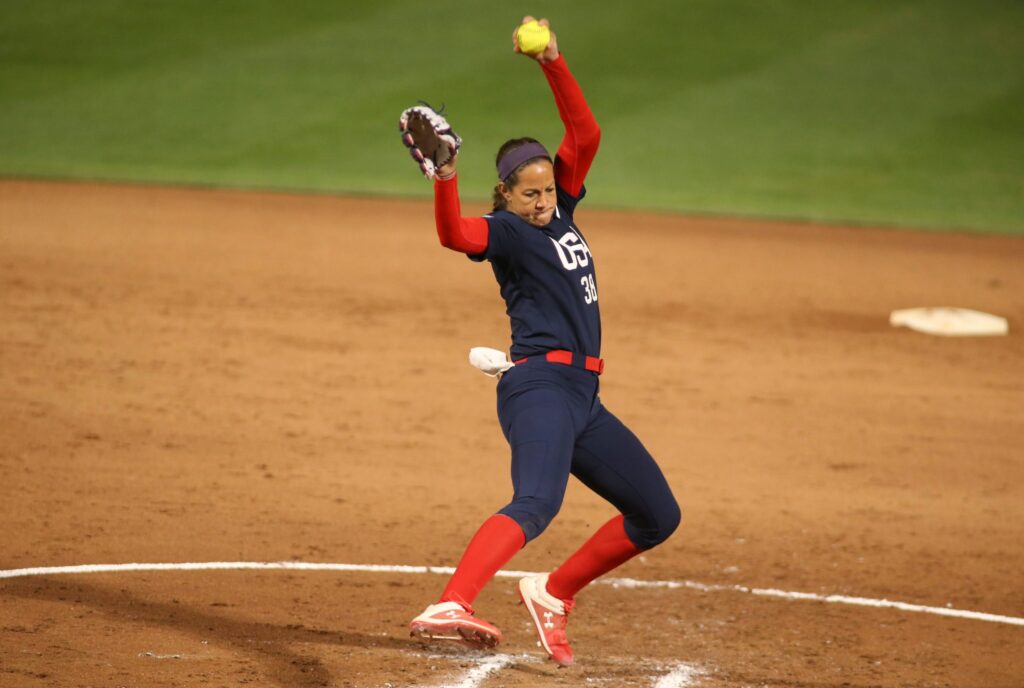Why did Cat Osterman come out of retirement and claw her way back onto the USA Softball National Team for a chance to fight for another gold medal at age 38? It’s simple. The southpaw pitcher has some serious unfinished business she needs to attend to.
Osterman’s first Olympic experience with Team USA was the epitome of sporting dominance and came in the middle of her illustrious college career at The University of Texas. Taking a red-shirt season in what would have been her junior year, Osterman pitched alongside legends Jennie Finch and Lisa Hernandez in an undefeated path to the gold medal at the 2004 Athens Games.
Her first win of the tournament came against Japan, giving the U.S. the one seed out of group play. As the youngest member on the team, Osterman finished the tournament with two wins and a save and led the team in total strikeouts. In a recent interview with Kelley O’Hara on the Just Women’s Sports Podcast, Osterman explains how special thatOlympic victory was for her:
“You can win other international events and hear your national anthem and it’s cool, but nothing like on the Olympic stage.”

Back in Austin the year after that tremendous experience, Osterman vividly remembers the moment her long-term Olympic dreams were swiped from under her feet. Watching ESPN with some fellow baseball student-athletes, they saw an announcement run across the bottom ticker stating the IOC would be removing baseball and softball from the Olympics after the 2008 Beijing Games.
“One of the baseball players was like ‘Looks like your career is going to be ended sooner,’” Osterman recalls to O’Hara. Whether the friend intended to throw such a hurtful barb is unclear, but it perfectly delineated the starkly different realities facing the young athletes. Osterman was by far the best up and coming softball pitcher in the country, if not the world. Her counterpart on the baseball side likely had a decade-long, multimillion-dollar MLB career to look forward to, but Olympic glory once every four years was the highest stage Osterman could hope to play on. Finding out from a news announcement along the bottom line of ESPN that those dreams would be over so early in her career felt like “a slap in the face.”
Osterman spent the next two years solidifying her status as the greatest college softball pitcher of all time. Upon graduation in 2006, she was a three-time National Player of the Year, four-time All-American, and two-time ESPY Award winner. She still holds the NCAA record for highest career strike-out-per-seven-inning ratio at 14.34, as well as UT records for total victories, ERA, shut-outs, and no-hitters.
After a stellar professional debut season in the National Pro Fastpitch softball league, it was once again time to take her skills to the global stage at the 2008 Beijing Olympics.
In another dominant performance, Osterman’s Team USA reached the gold medal match by going 7-0 in group play and outscoring their opponents a combined 57-2. Unlike four years prior in Athens, Osterman was now the top pitcher on the team, and she took the mound for the gold medal game against Japan.
Having already defeated Japan twice in route to the championship, the U.S. seemed poised for Olympic glory once again. But when Osterman came out after five innings the U.S. was trailing 1-2. Twice the U.S. couldn’t capitalize on a one-out, bases loaded opportunity, and after a wild throw home allowed Japan to score a third run in the top of the seventh, the deflation was tangible in the American dugout.
The U.S. went scoreless to finish the inning and Japan erupted into the exuberant elation of having won Olympic Gold while handing the U.S. their first Olympic loss in eight years and their first non-gold medal in Olympic softball since 1996.

For Osterman, it was the only two runs and only loss she’d allowed on the Olympic stage. And the aftertaste was bitter.
“Not only did we not win, it was almost a nightmare game. Anything that could go wrong did go wrong,” she vents to O’Hara, “It was brutal for quite a long time afterwards.”
And the salt that made the wound extra painful? Knowing there would be no chance for redemption. As far as she knew, her Olympic career was over.
Osterman spent the majority of the next near decade working in the college coaching ranks and crushing it in the National Pro Fastpitch league, a 16-year-old pro softball league where elite level players are able to continue their craft after college, albeit for extremely minimal salaries. When she retired from the NPF in 2015, Osterman was a three-time NPF Pitcher of the Year, four-time NPF Champion, and six-time All-NPF Team selection.
Upon first hearing that softball was being reinstated for the 2020 Tokyo Olympics, Osterman was initially just excited for the generation of players behind her, knowing they would now get to experience what she had before. Her longtime USA Softball coach encouraged her to submit her resume for a coaching role with Team USA. Shortly after acquiescing, she had an unfiltered conversation with a close friend, admitting to her, “Why am I trying to coach the team when I think I could probably still throw?”
With the unsubtle prodding only a close confidante can provide, Osterman owned up to wanting to suit up again for Team USA. So she shook off the dust, got back on the mound, and quickly proved that even in her late 30s, she is still one of the very best. This summer, playing in the inaugural Athletes Unlimited softball season, Osterman won the league’s individual title after accumulating the most player points over the course of the season. She did so while fanning many young players who looked up to her when they were kids
Whereas she was the youngest in her first Olympics, next summer Osterman will be the oldest on the roster as she heads to Japan, against whose national team she earned her first Olympic victory and also her sole Olympic defeat. Thirteen years after that premature exit from the biggest stage in sports, Cat Osterman, one of the greatest softball athletes of all time, has the chance once again to play in the global spotlight and cap her career with the (dare I say, golden) luster it deserves.

